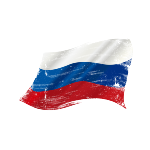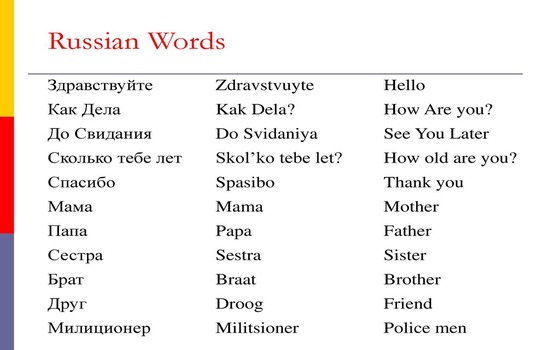 There is an opinion that Chinese language is the most difficult language of the world because it counts a large number of hieroglyphs and native speakers, correspondingly. But have you ever thought how many people speak in Russian? I bet you have. The real number is 258 million of speakers all over the world. Also Russian is the second language that is widely used in the internet – about 6% of all the web-sites are in Russian. Russian literature is the gold standard among others. Pushkin, Turgenev, Tolstoy, Chekhov, Yesenin… this list can be infinite and I am sure – you know at least one name.
There is an opinion that Chinese language is the most difficult language of the world because it counts a large number of hieroglyphs and native speakers, correspondingly. But have you ever thought how many people speak in Russian? I bet you have. The real number is 258 million of speakers all over the world. Also Russian is the second language that is widely used in the internet – about 6% of all the web-sites are in Russian. Russian literature is the gold standard among others. Pushkin, Turgenev, Tolstoy, Chekhov, Yesenin… this list can be infinite and I am sure – you know at least one name.
There seemed to be no problems – matrioshki, vareniki, borsch, vodka, tsar… are very familiar words. But when visiting Russia or russian-speaking countries you can come across very interesting colloquialisms that you have never met before. What we know about Russia? Usually we imagine snowstorm, bears and samovars. But these are stereotypes like the thing that Russian language is very simple.
See also: English-Russian audio dictionary .
If you meet a common russian-speaking man or woman you will hear some weird word combinations. I am sure you know how to pronounce «yes», «no», «maybe» and other simple words in Russian, but do you imagine that all these words can be combined in one phrase? When person isn’t fully confident at something – he or she says «maybe», but Russian people can say (verbatim) «yes no, maybe» – that means probably. In Russian it sounds like «da net, navernoye». If we go into details – this word combination can be understood as non-confident denial, in other words you don’t know how to refuse somebody and meanwhile you don’t want to hurt your interlocutor’s feelings. «Da net, navernoye» – like a phenomenon, everybody wants to explain it, but only Russian can. This phrase is one of the most original ones in Russian language. Plus they have one universal answer to all the issues or problems, they say «nothing» that pronounces «nichego» and means that there is nothing wrong, that’s all alright. Try to use these phrases when speaking with someone from russian-speaking country and you will be pleasantly surprised by the reaction of your interlocutor.

Also Russian is full of slangs. For example – usual phrase «how are you?» sounds like this: [Kak dee-leesh-kee?] and its specificity is in the last word «delishki» – diminutive from the word «dela» (russ.), in English – affairs, doings. To answer on this question you can choose a lot of queer words, for example: «super-puper» that is super-duper in English, or «chudnen’ko» that is cool or wonderful.
How could you notice russian-speaking people like diminutives. It also can be seen in such simple words as cat, dog, tea, coffee, mobile phone, daughter, son, mom, dad, etc. Usual «cat» in russian language sounds like «kotik» (diminutive) and means this cat but with some tenderness. The same situation with dog – «sobachka», tea – «chayok», coffee – «kofeyok», mobile phone – «mobilochka», daughter – «dochen’ka», son – «synochek», mom – «mamochka», dad – «papochka», etc.
Never forget about tongue-twisters, proverbs and sayings. In Russian language there are 2 or even 3 variants of each proverb that exists in this world. Commonly known proverb «Measure seven times, cut once» has the same translation in Russian – «Sem’ raz otmer’, odin raz otrezh». «Live and learn!» by John Ronald Reuel Tolkien from «The Fellowship of the Ring» has its own representation in the novel by Fyodor Mikhailovich Dostoevsky «Crime and Punishment» and sounds like «Vek zhivi – vek uchis’».
See also: How to write in Russian using an old orthography? and Russian sayings.
Few people know that Russian language borrowed enough words from English. For example: jeans, sweater, shorts, roast-beef, jam, brocker, dealer, distributor, marketing, PR, skateboard, browser, login, etc. All these word are pronounced like in English and called neologisms. English language also have a list with the words of Russian origin. For example: cosmonaut, sable, Tundra, pelmeni, okroshka, disinformation, kadet, soviet, beluga, etc.
As you can see – these absolutely different languages have common words, same proverbs and word-combinations, but each nation gave to it its specificity. English is the world language, it is obligatory in all the universities of the world, in every business-company, in each society. Russian – is the main language for the Commonwealth of Independent States countries. Russian classics has the same significance as English – everybody should know who is Charles Dickens, William Shakespeare, Jane Austen and Sir Arthur Conan Doyle. The same thing with Russian literature – familiarise with great Russian authors, acquaint with the culture and compare one with another.
It will be useful to watch Russian, also Soviet Union’s films, like «Moscow Does Not Believe in Tears» or «The Irony of Fate, or Enjoy Your Bath!». All the films made by «Mosfilm» can show you genuine Russian mentality, way of life and will give you a dose of everyday routine. By the way – all of them have English subtitles. so it won’t be hard. Try to listen to Russian pop-music, it will be easier to remember new words by singing it.
And remember – it is not hard to learn something knew, on the contrary, it is hard to stay in one place and do nothing. Live and learn!
